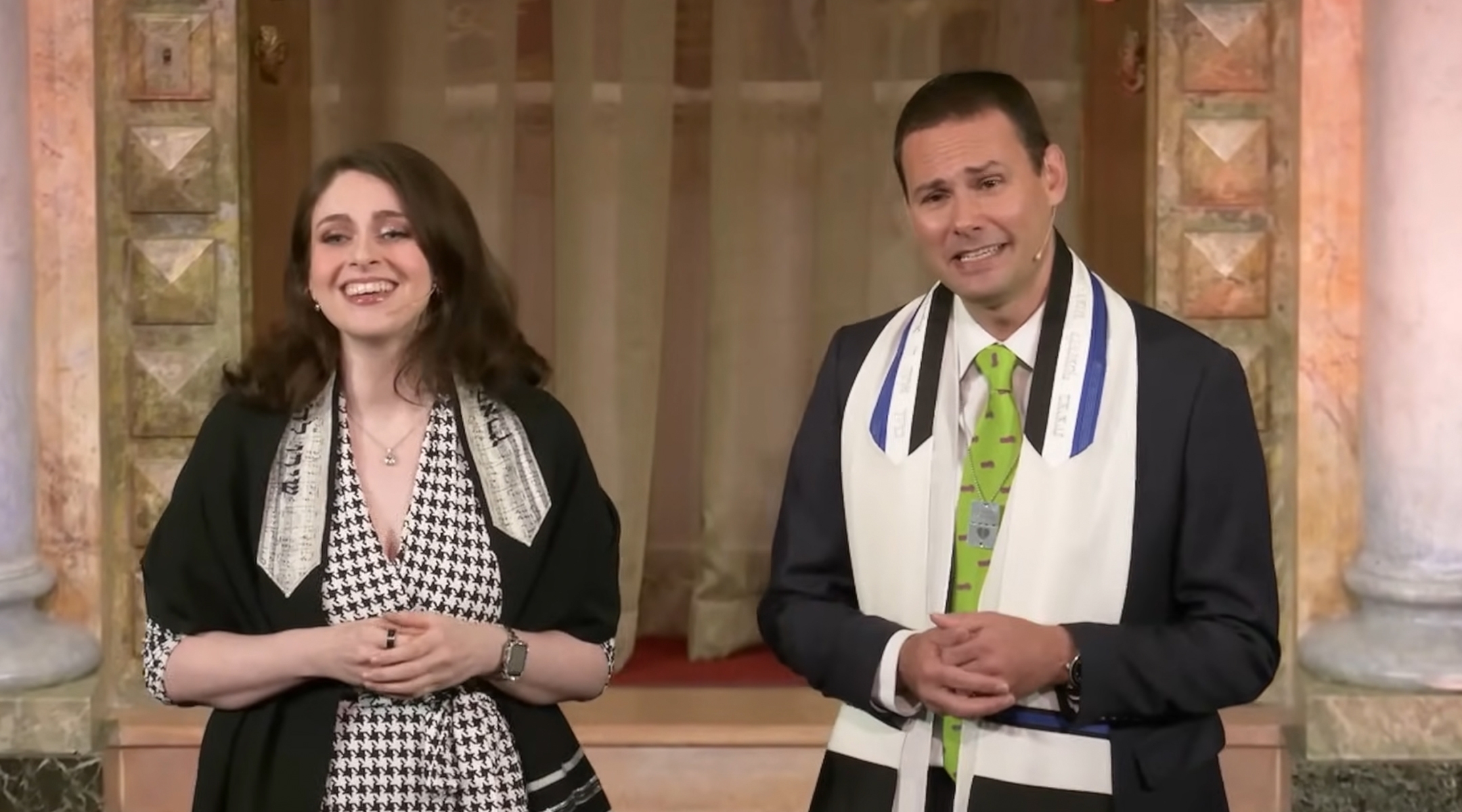Park Avenue Synagogue’s senior cantor, Azi Schwartz, may already be leader at one of Manhattan’s most venerable Conservative congregations, but following a recent Shabbat service, it appears that the synagogue’s musical output may become even more… popular.
On Dec. 7, Schwartz, along with his colleague, Assistant Cantor Mira Davis, premiered a new version of “Adon Olam” — a prayer that traditionally concludes Shabbat morning services — set to the tune “Popular” from the hit Broadway musical-turned-movie “Wicked.” A video of the cantors’ version of the song, “A Wicked Adon Olam,” filmed live in the synagogue’s sanctuary, was posted to social media on Friday and has since been viewed well over 100,000 times across platforms.
“Obviously, everyone is talking about ‘Wicked,’” Schwartz said of his and Davis’ choice to adapt the popular musical in the recent Shabbat service, which was geared toward the congregation’s students. “It’s always nice to see people are liking something — and, at the same time, we kind of knew that people would be very excited about this.”
Schwartz, 43, who grew up in Israel and has been Park Avenue Synagogue’s cantor for 16 years, has a storied history of performing pop culture takes on “Adon Olam” on the bimah, including a version of Coldplay’s “Sky Full of Stars” in honor of the bar mitzvah of his son Daniel earlier this year and, in 2016, a “Hamilton” version of the song, set to the tune “You’ll Be Back.”
“You’ve got to meet people where they are,” Schwartz said of his musical adaptations, pointing to the recent and worrying rise in antisemitism. “People need to know that it’s OK to be Jewish. It’s OK to bridge that gap of identities, between being American and being Jewish.”
Pointing to the popularity of his parodies, “it is a testament that people celebrate that dual identity,” he said.
“Wicked” began its long-tailed life in 1995 as a novel by Gregory McGuire, who is not Jewish — but the musical, which premiered on Broadway in 2003, was co-written by New York Jews Winnie Holzman and Stephen Schwartz. Our colleagues at Hey Alma have published a host of Jewish facts about the musical, including that the role of Elphaba, the Wicked Witch of the West, was originated by Jewish singer and actress Idina Menzel (of “Frozen” and “Rent” fame), and has been played by a variety of Jews, including Shoshana Bean and Caissie Levy.
In the film, which opened in November and smashed box office records, Elphaba is played by Cynthia Erivo, who is not Jewish. That hasn’t stopped some online and in the media from speculating that the role is “coded” Jewish, or that the plot is an allegory for Jewish history.
Schwartz has made his own determination. “It’s absolutely a Jewish story,” he said. “It’s a story about the other. It’s a story about the difficulty for the community to really accept the other for who they are. And, you know, Stephen Schwartz, who wrote the music — it’s so Jewish, and it’s so influenced by Jewish values and by the Jewish story.”
Cantor Schwartz — who is not, so far as he knows, related to the famed composer and lyricist — has also performed modern adaptations of other liturgical songs during services, including a Harry Styles version of “Etz Chayim” and, shortly after the death of singer, actor and civil rights activist Harry Belafonte in April 2023,“Ein Keloheinu” sung to the tune of “The Banana Boat Song.”
But Schwartz seems to have a soft spot for adaptations of “Adon Olam,” which is widely understood to be easy to fit to a variety of tunes.
“One, I do like the text; it’s one of the most central prayers and we conclude every service with it, and it has this final line of ‘Adonai li v’lo ira,’ ‘God is with me, I will not be afraid,’ which I think is a very hopeful message,” he said.
“It’s not just the liturgy itself, it’s where it is placed in the service — it’s always at the end, which is, you know, kind of an opportunity to give people something to hold on to, to to walk out singing and cheering and being joyful with something,” he added. “It’s a nice cherry on top of the cake.”
The New York Jewish Week brings you the stories behind the headlines, keeping you connected to Jewish life in New York. Help sustain the reporting you trust by donating today.





